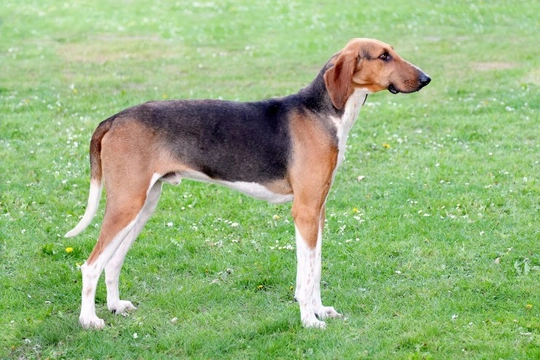
All about the Poitevin Scenthound
The Poitevin Hound is a very distinguished scenthound and one that has always been very highly prized in their native France and Europe. Strong and powerful, yet light and elegant, these attractive dogs are not that well known in other countries of the world other than with people who are keen hunters. With this said, anyone wishing to share a home with a Poitevin Hound could have trouble finding a breeder because the breed is so rarely seen outside of France.
A little background history
The Poitevin Scenthound is native to France having been first developed in a region of the country known as the Province de Poitou. To begin with the breed was called the Haut-Poitou Hound and they were created by the Marquis Francois de Larrye in 1962 to keep the number of wolves down. It is thought that the breeds used to create the Poitevin were the Montemboeuf, the Chien Ceris with Irish Scenthounds and Greyhounds being introduced into the mix as well.
The Poitevin throughout time has been highly prized for their hunting and scenting abilities because they were bred to be hardy and therefore capable of working over more challenging terrains. These scenthounds work in packs or alone. Sadly, after the French Revolution, the last of the Poitevin packs died because they contracted rabies. However, with a single dog and two females remaining and thanks to the efforts of dedicated breed enthusiasts the breed was saved.
In the twentieth Century more breed enthusiasts set about restoring the breed to their former glory and carefully introducing Foxhounds as well as other hounds to the mix. Today, their numbers have slowly risen with the Pointevin Hound still be highly prized in their native France although the breed is much less well known in other countries of the world including the UK.
Appearance
Attractive, athletic and elegant looking, the Poitevin is a medium to large sized dog that can weigh in at around 35 kg. Males are slightly taller than their female counterparts, standing at anything from 62 to 72 cm at the withers whereas females are that much shorter being 60 to 70 cm at the withers. Their heads are moderate in size being long, yet not terribly wide. Their skulls slope gently to a dog's foreface and muzzles are a little convex in shape. They have prominent, strong and wide noses with dogs having strong jaws and a perfect scissor bite. Ears are moderately long and set nicely low on a dog's head turning slightly inwards. They have large, black rimmed eyes that are brown in colour with the Poitevin always having a kind, yet alert expression in them.
Their necks are very elegant being slim yet powerful showing no dewlap. Their bodies are slender but well-muscled with dogs have muscular loins and long rib cages. Chests are deep with dogs having well tucked up bellies. They have powerful forequarters and nicely develop hindquarters with dogs having a moderately long tail that's covered in fine hair which they carry slightly curved adding to the breed's elegance.
The Poitevin has a short, close-lying glossy coat that's another of their very distinguishing physical features. They come in a variety of colours which includes the following:
- Tricolour with a black saddle
- Orange and white with black markings
- Wolf grey although very rare
Temperament
Spirited, courageous, hardy and loyal, the Poitevin Hound is not the best choice when it comes to being a family pet being much better suited to living in a pack and being used as a working dog. These scenthounds boast an incredibly amount of stamina and can keep working for hours over harsher terrains when asked. They need to be handled firmly so that dogs understand what is expected of them and who is boss which means they need to be managed by people who are familiar with their very specific needs.
With this said, a Poitevin Hound needs a lot of space to express themselves and having such a strong hunting instinct, training them can prove challenging to anyone who is unfamiliar with the breed.
Shedding
Having short, close-lying coats, the Poitevin is low maintenance when it comes to grooming and like other breeds they shed steadily throughout the year only more so in the spring and autumn when their summer and winter coats grow through.
Training
It takes a lot of time, patience and understanding of the breed to successfully train a Poitevin Hound. As previously mentioned, they are better suited to working with other dogs in packs and therefore not the best choice when it comes to family pets and companions.
Exercise
Being so energetic and active by nature, a Poitevin Hound needs a tremendous amount of exercise to be truly happy bearing in mind that they boast a tremendous amount of stamina which means they will happily run for hours and hours even over harsher terrains.
Children and Pets
Kind and gentle, the Poitevin Hound is not an aggressive dog by nature, but they are rarely kept in a domestic environment. With this said, they do not have a nasty bone in their bodies except when on the scent of their prey. Working in a pack is deeply embedded in a Poitevin Hound's psyche as such they are generally good around other dogs although care should always be taken when they encounter smaller animals and pets.
What about health issues?
The Poitevin is generally a robust and healthy breed thanks to careful and selective breeding, they don't seem to suffer from any of the hereditary and congenital issues that often affect other breeds.
Life expectancy
The average life span of a Poitevin Hound is between 11 and 12 years when correctly cared for and fed a good quality diet to suit their ages.



